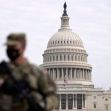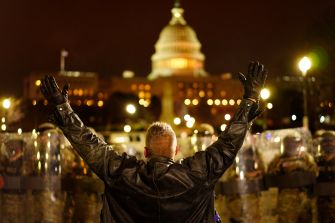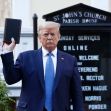A Washington, D.C. resident has filed a federal lawsuit claiming his constitutional rights were violated after he was detained for peacefully protesting the National Guard’s deployment in the city. The complaint, filed on October 23 in the U.S. District Court for the District of Columbia, was brought by Sam O’Hara through the American Civil Liberties Union of D.C. against Ohio National Guard member Sgt. Devon Beck, four officers of the Metropolitan Police Department, and the District of Columbia.
According to the complaint, O’Hara was detained while staging what he described as a satirical protest on September 11, 2025, in the Logan Circle neighborhood. He followed uniformed National Guard members on public streets while playing Darth Vader’s “Imperial March” from the Star Wars films on his phone. O’Hara recorded the encounter and posted it on TikTok, where it quickly gained wide attention alongside earlier clips of his protests against the National Guard.
The filing states that Sgt. Beck confronted O’Hara during the protest and threatened to call the Metropolitan Police if he did not stop. When O’Hara continued recording, several police officers arrived, handcuffed him, and held him for about twenty minutes before releasing him without charges. O’Hara claims that the officers accused him of harassment, refused to loosen the handcuffs despite his complaints of pain, and prevented him from continuing his peaceful protest.
The lawsuit argues that these actions violated O’Hara’s constitutional rights under the First and Fourth Amendments. It also includes local claims under District of Columbia law, accusing the city and its officers of false arrest, false imprisonment, and battery.
The First Amendment protects the right to speak, protest, and express political opinions in public spaces. Courts have recognized that individuals may record public officials performing their duties and that such recording is a form of expression. O’Hara claims that by detaining him for playing music and filming, the officers and National Guard members interfered with his protected speech and retaliated against him for his viewpoint.
The Fourth Amendment protects people from being stopped or arrested unless police have a clear legal reason to believe a crime has occurred. It also guards against unreasonable searches, seizures, or use of force. The complaint states that O’Hara was standing several feet away from the Guard members, did not obstruct them, and posed no threat. It further claims that the use of tight handcuffs and the length of the detention were unreasonable under the circumstances.
In addition to the federal constitutional claims, the lawsuit includes local claims under the District’s longstanding common law protections against unlawful detention and physical harm by authorities. False arrest and false imprisonment refer to being held without a valid reason, while battery covers physical contact that causes harm or discomfort. The filing argues that the actions of the officers violated these protections as well.
The events took place amid broader public debate about the National Guard’s presence in Washington, D.C. The complaint notes that the deployment began in August 2025 after President Donald Trump directed the Department of Defense to address what he described as rising crime in the District. The order called for members of the D.C. National Guard and additional troops from several states to patrol city streets. The Ohio National Guard sent 150 military police to participate. O’Hara’s protest, according to the lawsuit, was meant to criticize what he saw as an unnecessary use of military personnel in civilian neighborhoods.






